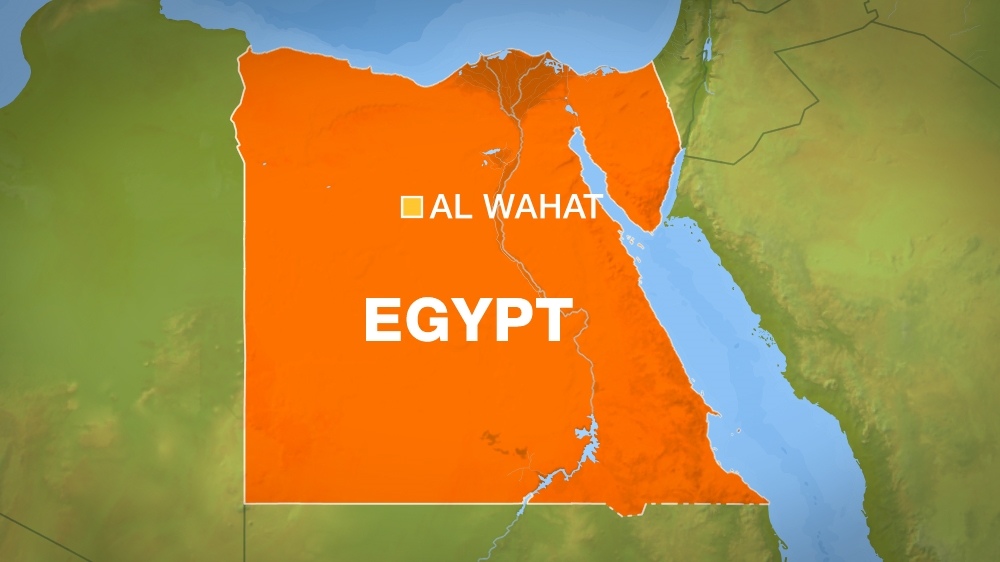Egyptian forces kill 12 in tourist convoy
At least 12 tourists mistakenly killed, including two Mexicans, in Egyptian air strike on convoy in the Western Desert.

Egyptian security forces have killed 12 people, including Mexican tourists, after mistakenly shelling their convoy while pursuing fighters in the country’s Western Desert.
A joint police and military operation on Sunday “chasing terrorist elements” in Al Wahat “mistakenly” targeted four pick-up trucks carrying Mexican tourists, the interior ministry said in a statement (Arabic).
Keep reading
list of 4 itemsAustin confirms Russians deployed to airbase housing US military in Niger
What’s next as ‘heavy-handed’ US negotiates pullout from Niger?
Putin says ‘radical Islamists’ behind Moscow concert hall attack
There were conflicting reports about the number of Mexicans killed.
Two Mexicans were killed, Mexican President Enrique Pena Nieto said, though Egyptian security and judicial sources later told Reuters that eight Mexicans and four Egyptians were killed, and eight Mexicans and two Egyptians were wounded.

The Mexican foreign ministry said in a statement that the victims were still being identified, and foreign ministry personnel were working with the families of the victims.
Al Jazeera’s John Holman, reporting from Oaxaca in Mexico, said that the Mexican government demanded a thorough investigation into the incident.
“President Enrique Pena Nieto on Twitter condemned the incident. He also said that he is adding to the diplomatic personnel in Egypt to attend to the people that have been injured.”
Egypt said “the incident led to the death of 12 Mexicans and Egyptians and wounding of 10 others”.
“The area they were in was off limits to foreign tourists,” it added.
México condena estos hechos en contra de nuestros ciudadanos y ha exigido al gobierno de Egipto una exhaustiva investigación de lo ocurrido.
— Enrique Peña Nieto (@EPN) September 14, 2015
The Mexican ambassador had visited five other nationals being treated at the Dar al-Fouad Hospital in a western Cairo suburb, where they were listed in stable condition, according to the Mexican foreign ministry.
The ministry gave few details about what happened, saying an “undetermined” number of Mexican tourists were attacked “in circumstances that are still not clear”.
Egypt’s interior ministry did not indicate whether the tourists were targeted with automatic weapons or aerial bombardment during the operation against fighters on the Al Wahat district.
Egypt armed group pledges allegiance to ISIL
The Islamic State of Iraq and the Levant (ISIL) group in Egypt said in a statement that it had “resisted a military operation in the Western Desert” on Sunday.
The vast Western Desert, popular with tourists for its oases and rock formations, is also a hideout for armed groups.
Last month the Egyptian branch of the ISIL group beheaded a young Croatian there who was working for a French company and have also launched numerous attacks against security forces.
Struggle against ISIL
Egypt has been struggling to quell an insurgency in the Sinai peninsula, their main holdout in the country’s east, since the military overthrew fromer president Mohamed Morsi in 2013.
It has one of the region’s most powerful and well-equipped militaries and was further boosted by recent deliveries of F-16 warplanes by Washington and Rafale fighter jets from France.
Last week the army launched an operation in the Sinai area against ISIL which it said killed 56 fighters.
The army often reports large death tolls among the armed group but they are impossible to verify and there has been little noticeable effect on ISIL’s ability to carry out deadly attacks on the security forces.
The government says hundreds of police and soldiers have been killed, many of them in attacks claimed by ISIL’s Sinai Province affiliate.
ISIL’s Egypt affiliate ‘beheads Croatian hostage’
After launching spectacular attacks targeting security forces in its North Sinai bastion over the past two years, ISIL fighters in Egypt are now adopting tactics similar to the main ISIL group in Iraq and Syria – abducting and beheading foreigners.

In July the group claimed the bombing of the Italian consulate in Cairo in which one civilian was killed, and it also claimed the killing of an American employee of oil company Apache last year in the Western Desert.
The beheading in July of Croatian engineer Tomislav Salopek, claimed by the ISIL group, appeared aimed at threatening tourists and foreign employees of Western firms – two cornerstones of an economy battered by years of political unrest since the 2011 uprising that ousted then-president Hosni Mubarak.
Egypt’s economy is traditionally driven by tourism but arrivals have plummeted as the country tries to recover from years of political and economic chaos.
About 10 million tourists visited in 2014, down sharply from a 2010 figure of almost 15 million people who visited the country with its archaeological sites and Red Sea resorts.